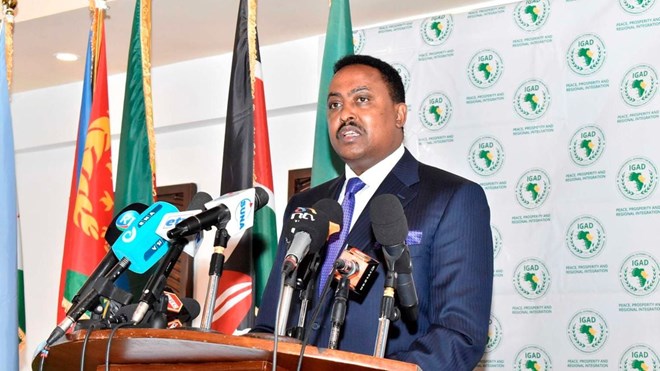
By AGGREY MUTAMBO
Thursday February 16, 2023

Workneh Gebeyehu, the Ethiopian diplomat who has been at the helm of the Intergovernmental Authority on Development. PHOTO | FILE | NMG
Workneh Gebeyehu, the Ethiopian diplomat who has been at the helm of the Intergovernmental Authority on Development (Igad), spoke to Aggrey Mutambo on peace efforts in the region.
****
How strong is Igad in dealing with the problems of the region?
Igad is a replica of member states. So, Igad is always based upon the strength and weakness of the member states who have given us the will to address some of the critical issues that bridge from one country to another.
Of course, we have a lot of challenges; manmade and natural. Igad has in the past year navigated a lot of challenges, such as the issue of South Sudan, Somalia and of course Sudan.
The conflict in Ethiopia has mainly been resolved because of Igad, under the umbrella of the African Union.
The issue of Sudan and Ethiopia – over their border – that's also critical and one that is a big worry for the region. We did the task of defusing tensions. And yes, we effectively facilitated mediation and the negotiations but we still have some gaps. We are working hard to ensure Eritrea returns to the family. Eritrea has always been part of us and we want to continue our collaboration on issues that are common to us.
What are some of Igad’s achievements over the past year?
The first one is in the area of peace and security; the Ethiopian (Tigray) issue, and the Sudan-Ethiopian (border) issue. We are still working on the South Sudan issue and on the Republic of Sudan issue.
On climate change, we are working on creating awareness in all our member states. We have a very efficient technology centre in Nairobi that serves all regions.
Sudan hasn't had a formal government for more than a year. Could you comment on the progress in trying to achieve long-term stability?
Sudan is the chairman of the Igad Summit. And Igad is highly involved in the peace process, with the African Union and United Nations.
It is most important for Sudan to have a civilian-led government. We are working with the military and the civilian opposition group. Progress has been slow, but we are expecting to establish in the near future – hopefully in less than a month – so they can have the civilian government we are pushing for.
Some Igad members also belong to other regional blocs. What’s your working relationship with these other regional organisations?
Member states have their own national interests from the right and from the left. Kenya has a strong bond with Ethiopia and Somalia as well as other parts of the Horn of Africa.
Uganda and South Sudan have a relationship in terms of economy and politics. They have interaction within the Horn of Africa and from the East African Community. This relationship doesn't affect us as there is no duplication of effort because we work based on the interests of members. So, if they want this thing to happen in the East African Community, they can do it that way. But if it is decided that it happens in the Horn of Africa side, we can work together as well.
What has been the most effective means of fighting extremism in our region?
One of the issues that we are working on is the software, especially the software of our youth. The mind and the spirit of our youth should be a territory of peace.
Our Counter Violent Extremism Centre is one of the ideas we are using to reach out to our youths. The centre is working very efficiently on that area. But we have a problem of capacity and finance.
Could you comment on the strategy for long-term stability in Somalia?
The long-term strategy for Somalia is strengthening the capability of the security institutions. That is a big gap that we are still not able to call a success. The second is Somalia should have stronger institutions. So, we have to work on the strength and the capability of government services. The good thing is that in Somalia, there are some positives. It is difficult to unseat a sitting President in Africa through elections, something Somalia is doing easily. We have to capitalise on that to make it stronger. That is why you see neighbours are now in solidarity with Somalia.
What is the nature of Igad’s relationship with Eritrea?
We are working hard to ensure Eritrea returns to the family. Eritrea has always been part of us and we want to continue our collaboration on issues that are common to us.
So, they are always a part of the family and we hope to see them back soon.
The most important thing is supporting the leadership, the government and the security of that country.